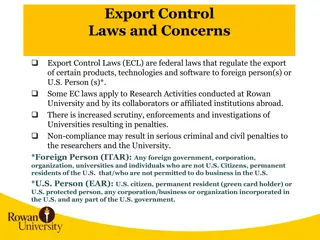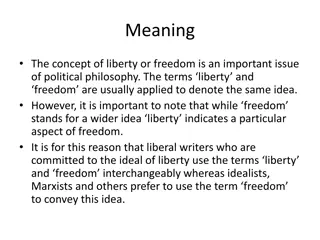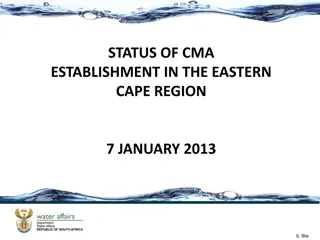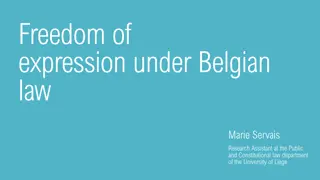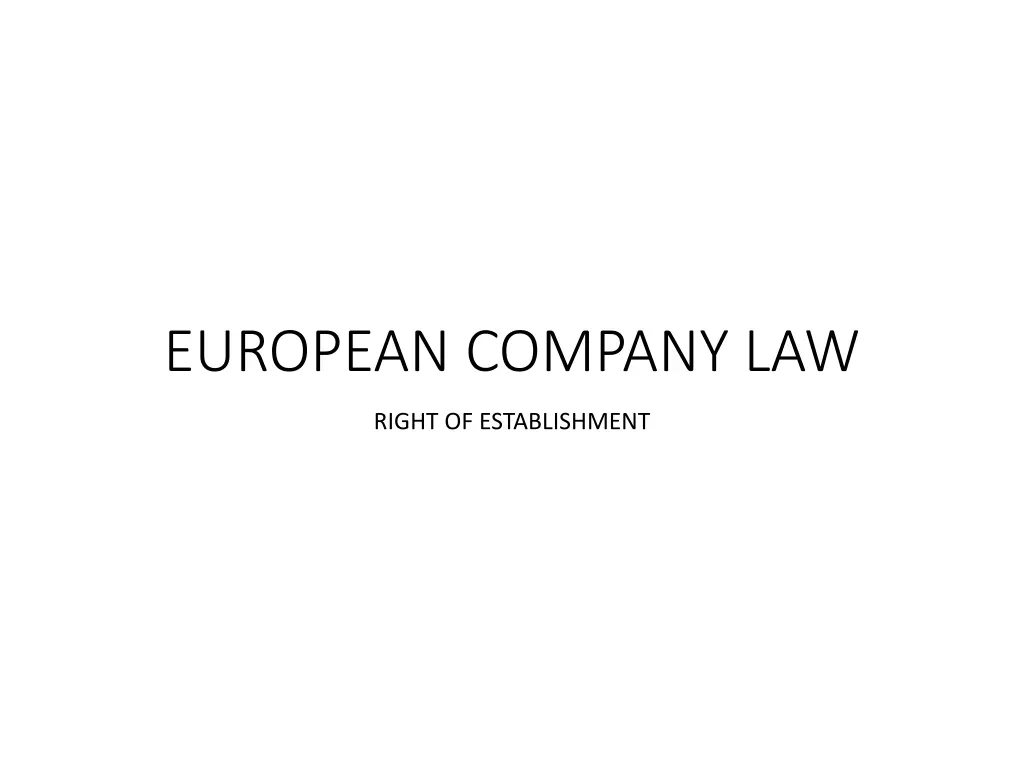
European Company Law and Right of Establishment
Explore the provisions of European Company Law and the Right of Establishment under Article 49 TFEU, including the freedom for nationals of Member States to establish businesses across borders. Learn about the treatment of companies and firms formed within the Union and the coordination of provisions for foreign nationals. Dive into primary and secondary establishment rights and more with Italian and European Company Law expert dott. Giulia Gabassi.
Download Presentation

Please find below an Image/Link to download the presentation.
The content on the website is provided AS IS for your information and personal use only. It may not be sold, licensed, or shared on other websites without obtaining consent from the author. If you encounter any issues during the download, it is possible that the publisher has removed the file from their server.
You are allowed to download the files provided on this website for personal or commercial use, subject to the condition that they are used lawfully. All files are the property of their respective owners.
The content on the website is provided AS IS for your information and personal use only. It may not be sold, licensed, or shared on other websites without obtaining consent from the author.
E N D
Presentation Transcript
EUROPEAN COMPANY LAW RIGHT OF ESTABLISHMENT
EUROPEAN COMPANY LAW EUROPEAN LEGISLATION COURT OF JUSTICE REGULATIONS DIRECTIVES AA 2019/2020 - Italian and European Company Law - dott. Giulia Gabassi 2
RIGHT OF ESTABLISHMENT Article 49 TFEU (ex Article 43 TEC) Within the framework of the provisions set out below, restrictions on the freedom of establishment of nationals of a Member State in the territory of another Member State shall be prohibited. Such prohibition shall also apply to restrictions on the setting-up of agencies, branches or subsidiaries by nationals of any Member State established in the territory of any Member State. Freedom of establishment shall include the right to take up and pursue activities as self-employed persons and to set up and manage undertakings, in particular companies or firms within the meaning of the second paragraph of Article 54, under the conditions laid down for its own nationals by the law of the country where such establishment is effected, subject to the provisions of the Chapter relating to capital. AA 2019/2020 - Italian and European Company Law - dott. Giulia Gabassi 3
Article 54 TFEU(ex Article 48 TEC) Companies or firms formed in accordance with the law of a Member State and having their registered office, central principal place of business within the Union shall, for the purposes of this Chapter, be treated in the same way as natural persons who are nationals of Member States. Companies or firms means companies or firms constituted under civil including cooperative societies, and other legal persons governed by public or private law, save for those which are non-profit-making. administration or or commercial law, AA 2019/2020 - Italian and European Company Law - dott. Giulia Gabassi 4
Article 52 (ex Article 46 TEC) 1. The provisions of this Chapter and measures taken in pursuance thereof shall not prejudice the applicability of provisions laid down by law, regulation or administrative action providing for special treatment for foreign nationals on grounds of public policy, public security or public health. 2. The European Parliament and the Council shall, acting in accordance with the ordinary legislative procedure, issue directives for the coordination of the abovementioned provisions. AA 2019/2020 - Italian and European Company Law - dott. Giulia Gabassi 5
De Luca, European company law PRIMARY ESTABLISHMENT The right to set up and manage companies or firm in any member States, under the same condition laid down for their own nationals SECONDARY ESTABLISHMENT The right to set up agencies, branches or subsidiaries in any Member States, under the same conditions laid down for their own nationals AA 2019/2020 - Italian and European Company Law - dott. Giulia Gabassi 6
The reference for a preliminary ruling The reference for a preliminary ruling is a procedure exercised before the Court of Justice of the European Union. This procedure enables national courts to question the Court of Justice on the interpretation or validity of European law. The reference for a preliminary ruling therefore offers a means to guarantee legal certainty by uniform application of EU law. General scope of preliminary rulings The Court of Justice Decision has the force of res judicata. It is binding not only on the national court on whose initiative the reference for a preliminary ruling was made but also on all of the national courts of the Member States. In the context of a reference for a preliminary ruling concerning validity, if the European instrument is declared invalid all of the instruments adopted based on it are also invalid. It then falls to the competent European institutions to adopt a new instrument to rectify the situation. (http://eur-lex.europa.eu) AA 2019/2020 - Italian and European Company Law - dott. Giulia Gabassi 7
JUDGMENT OF THE COURT 30 November 1995 in Case C-55/94, Gebhard National measures liable to hinder or make less attractive the exercise of fundamental freedoms guaranteed by the Treaty must fulfil four conditions: they must be applied in a non-discriminatory manner; they must be justified by imperative requirements in the general interest; they must be suitable for securing the attainment of the objective which they pursue; and they must not go beyond what is necessary in order to attain it. AA 2019/2020 - Italian and European Company Law - dott. Giulia Gabassi 8
DAILY MAIL, JUDGMENT OF THE COURT 27thSeptember 1988, in C-81/87 (from the judgement) The applicant (DAILY MAIL), which is an investment holding company, applied for consent under the national provision in order to transfer its central management and control to the Netherlands, whose legislation does not prevent foreign companies from establishing their central management there; the company proposed, in particular, to hold board meetings and to rent offices for its management in the Netherlands. Without waiting for that consent, it subsequently decided to open an investment management office in the Netherlands with a view to providing services to third parties AA 2019/2020 - Italian and European Company Law - dott. Giulia Gabassi 9
the principal reason for the proposed transfer of central management and control was to enable the applicant, after establishing its residence for tax purposes in the Netherlands, to sell a significant part of its non-permanent assets and to use the proceeds of that sale to buy its own shares, without having to pay the tax to which such transactions would make it liable under United Kingdom tax law, in regard in particular to the substantial capital gains on the assets which the applicant proposed to sell. After establishing its central management and control in the Netherlands the applicant would be subject to Netherlands corporation tax, but the transactions envisaged would be taxed only on the basis of any capital gains which accrued after the transfer of its residence for tax purposes AA 2019/2020 - Italian and European Company Law - dott. Giulia Gabassi 10
After a long period of negotiations with the Treasury, which proposed that it should sell at least part of the assets before transferring its residence for tax purposes out of the United Kingdom, the applicant initiated proceedings before the High Court of Justice, Queen's Bench Division, in 1986. Before that court, it claimed that Articles 52 and 58 of the EEC Treaty gave it the right to transfer its central management and control to another Member State without prior consent or the right to obtain such consent unconditionally AA 2019/2020 - Italian and European Company Law - dott. Giulia Gabassi 11
The questions arose in proceedings between Daily Mail and General Trust PLC, the applicant proceedings (hereinafter refered to as 'the applicant ), and H.M. Treasury for a declaration, inter alia, that the applicant is not required to obtain consent under United Kingdom tax legislation in order to cease to be resident in the United Kingdom for the purpose of establishing its residence in the Netherlands in the main AA 2019/2020 - Italian and European Company Law - dott. Giulia Gabassi 12
? (1) Do Articles 52 and 58 of the EEC Treaty preclude a Member State from prohibiting a body corporate with its central management and control in that Member State from transferring without prior consent or approval that central management and control to another Member State in one or both of the following circumstances, namely where: (a) payment of tax upon profits or gains which have already arisen may be avoided; (b) were the company to transfer its central management and control, tax that might have become chargeable had the company retained its central management and control in that Member State would be avoided? (2) Does Council Directive 73/148/EEC give a right to a corporate body with its central management and control in a Member State to transfer without prior consent or approval its central management and control to another Member State in the conditions set out in Question 1 ? If so, are the relevant provisions directly applicable in this case? AA 2019/2020 - Italian and European Company Law - dott. Giulia Gabassi 13
? (3) If such prior consent or approval may be required, is a Member State entitled to refuse consent on the grounds set out in Question 1 ? (4) What difference does it make, if any, that under the relevant law of the Member State no consent is required in the case of a change of residence to another Member State of an individual or firm?' AA 2019/2020 - Italian and European Company Law - dott. Giulia Gabassi 14
The national court asks to determine whether Articles 52 and 58 of the Treaty give a company incorporated under the legislation of a Member State and having its registered office there the right to transfer its central management and control to another Member State. If that is so, the national court goes on to ask whether the Member State of origin can make that right subject to the consent of national authorities, the grant of which is linked to the company's tax position AA 2019/2020 - Italian and European Company Law - dott. Giulia Gabassi 15
DAILY MAIL UK claims essentially that Article 58 of the Treaty expressly confers on the companies to which it applies the same right establishment Member State as is conferred on natural persons by Article 52. The transfer of management and control of a company to another Member State amounts establishment of the company in that Member State because the company is locating its centre of decision-making constitutes genuine and effective economic activity argues provisions of the Treaty do not give companies a general right to move their central management and control from one Member State to another. The fact that the central management and control of a company is located in a Member State does not itself necessarily imply any genuine and effective economic activity on the territory of that Member State and cannot therefore be regarded as establishment within the meaning of Article 52 of the Treaty essentially that the of primary another in the central to the there, which AA 2019/2020 - Italian and European Company Law - dott. Giulia Gabassi 16
COMMISSION emphasizes first of all that in the present state of Community law, the conditions under which a company may transfer its central management and control from one Member State to another are still governed by the national law of the State in which it is incorporated and of the State to which it wishes to move. In that regard, the Commission refers to the differences between the national systems of company law. Some of them permit the transfer of the central management and control of a company and, among those, certain attach no legal consequences to such a transfer, even in regard to taxation. Under other systems, the transfer of the management or the centre of decision-making of a company out of the Member State in which it is incorporated results in the loss of legal personality. However, all the systems permit the winding-up of a company in one Member State and its reincorporation in another. The Commission considers that where the transfer of central management and control is possible under national legislation, the right to transfer it to another Member State is a right protected by Article 52 of the Treaty AA 2019/2020 - Italian and European Company Law - dott. Giulia Gabassi 17
COURT freedom of establishment constitutes one of the fundamental principles of the Community and that the provisions of the Treaty guaranteeing that freedom have been directly applicable since the end of the transitional period Even though those provisions are directed mainly to ensuring that foreign nationals and companies are treated in the host Member State in the same way as nationals of that State, they also prohibit the Member State of origin from hindering the establishment in another Member State of one of its nationals or of a company incorporated under its legislation which comes within the definition contained in Article 58 AA 2019/2020 - Italian and European Company Law - dott. Giulia Gabassi 18
the rights guaranteed by Article 52 et seq. would be rendered meaningless if the Member State of origin could prohibit undertakings from leaving in order to establish themselves in another Member State In the case of a company, the right of establishment is generally exercised by the setting-up of agencies, branches or subsidiaries, as is expressly provided for in the second sentence of the first paragraph of Article 52 A company may also establishment by taking part in the incorporation of a company in another Member State. exercise its right of AA 2019/2020 - Italian and European Company Law - dott. Giulia Gabassi 19
The provision of United Kingdom law at issue in the main proceedings imposes transactions such as those described above. Nor does it stand in the way of a partial or total transfer of the activities of a company incorporated in the United Kingdom to a company newly incorporated in another Member State, if necessary after winding-up and, consequently, the settlement of the tax position of the United Kingdom company. It requires Treasury consent only where such a company seeks to transfer its central management and control out of the United Kingdom while maintaining personality and its status as a United Kingdom company. no restriction on its legal AA 2019/2020 - Italian and European Company Law - dott. Giulia Gabassi 20
unlike natural persons, companies are creatures of the law and, in the present state of Community law, creatures of national law. They exist only by virtue national legislation determines their incorporation and functioning of the varying which AA 2019/2020 - Italian and European Company Law - dott. Giulia Gabassi 21
the Treaty regards the differences in national legislation required connecting factor and the question whether and if so how the registered office or real head office of a company incorporated under national law may be transferred from one Member State to another as problems which are not resolved by the rules concerning the right of establishment but must be dealt with by future legislation or conventions concerning the AA 2019/2020 - Italian and European Company Law - dott. Giulia Gabassi 22
The ECJ stated: Articles 52 and 58 of the Treaty cannot be interpreted as conferring on companies incorporated under the law of a Member State a right to transfer their central management and control and their central administration to another Member State while retaining their status as companies incorporated under the legislation of the first Member State. The answer to the first part of the first question must therefore be that in the present state of Community law Articles 52 and 58 of the Treaty, properly construed, confer no right on a company incorporated under the legislation of a Member State and having its registered office there to transfer its central management and control to another Member State AA 2019/2020 - Italian and European Company Law - dott. Giulia Gabassi 23
Centros case (ECJ, 9 Mar. 1999, Case C- 212/1997) (from the judgement) Mr. and Mrs Bryde, a Danish couple residing in Denmark registered a private company named Centros Ltd. in England and Wales; Centros has never traded since its formation. Since United Kingdom law imposes no requirement on limited liability companies as to the provision for and the paying-up of a minimum share capital, Centros's share capital, which amounts to GBP 100, has been neither paid up nor made available to the company. It is divided into two shares held by Mr and Mrs Bryde, Danish nationals residing in Denmark. Mrs Bryde is the director of Centros, whose registered office is situated in the United Kingdom, at the home of a friend of Mr Bryde; During the summer of 1992, Mrs. B. requested the Erhvervs-og Selskabsstyrelsen (the Trade and Companies Board) under the Danish Department of Trade, to register a branch of Centros in Denmark; Pseudo-foreign company AA 2019/2020 - Italian and European Company Law - dott. Giulia Gabassi 24
The Board refused that registration on the grounds, inter alia, that Centros, which does not trade in the United Kingdom, was in fact seeking to establish not a branch but a principal establishment in Denmark, by circumventing the national rules concerning, in particular, the paying-up of the minimum capital required companies; The Board submits that its refusal to grant registration is not contrary to Articles 52 and 58 of the Treaty since the establishment of a branch in Denmark would seem to be a way of avoiding the national rules on the provision for and the paying-up of minimum share capital. Furthermore, its refusal to register is justified by the need to protect private or public creditors and other contracting parties and also by the need to endeavour to prevent fraudulent insolvencies for Danish private AA 2019/2020 - Italian and European Company Law - dott. Giulia Gabassi 25
Centros brought an action before the court (Ostre Landsret) against the refusal of the board to give effect to that registration. Because of the court upholding the argument of the board, Centros appealed to the Supreme Court (Hojesteret); The Danish Supreme Court referred questions about the interpretation of the relevant articles of the EC Treaty to the ECJ for a preliminary ruling. AA 2019/2020 - Italian and European Company Law - dott. Giulia Gabassi 26
? Is it compatible with Article 52 of the EC Treaty, in conjunction with Articles 56 and 58 thereof, to refuse registration of a branch of a company which has its registered office in another Member State and has been lawfully founded with company capital of GBP 100 (approximately DKK 1 000) and exists in conformity with the legislation of that Member State, where the company does not itself carry on any business but it is desired to set up the branch in order to carry on the entire business in the country in which the branch is established, and where, instead of incorporating a company in the latter Member State, that procedure must be regarded as having been employed in order to avoid paying up company capital of not less than DKK 200 000 (at present DKR 125 000)? AA 2019/2020 - Italian and European Company Law - dott. Giulia Gabassi 27
the national court is in substance asking whether it is contrary to Articles 52 and 58 of the Treaty for a Member State to refuse to register a branch of a company formed in accordance with the legislation of another Member State in which it has its registered office but where it does not carry on any business when the purpose of the branch is to enable the company concerned to carry on its entire business in the State in which that branch is to be set up, while avoiding the formation of a company in that State, thus evading application of the rules governing the formation of companies which are, in that State, more restrictive so far as minimum paid-up share capital is concerned AA 2019/2020 - Italian and European Company Law - dott. Giulia Gabassi 28
Danish government Mr. and Mrs. Bride Article 52 of the Treaty is not applicable in the case in the main proceedings, since the situation is purely internal to Denmark. Mr and Mrs Bryde, Danish nationals have formed a company in the United Kingdom which does not carry on any actual business there with the sole purpose business in Denmark through a branch and thus of avoiding application of Danish legislation on the formation of private limited companies. It considers that in such formation by nationals of one Member State of a company in another Member State does not amount to a relevant external element Community law and, in particular, freedom of establishment the refusal to register in Denmark a branch of their company formed in accordance with the law of another Member State in which its has its registered office constitutes an obstacle to freedom of establishment, it must be borne in mind that that freedom, conferred by Article 52 of the Treaty on Community nationals, includes the right for them to take up and pursue activities as self-employed persons and to set up and manage undertakings under the same conditions as are laid down by the law of the Member State of establishment for its own nationals. of carrying on circumstances the in the light of AA 2019/2020 - Italian and European Company Law - dott. Giulia Gabassi 29
COURT Under Article 58 of the Treaty companies or firms formed in accordance with the law of a Member State and having their registered office, central administration or principal place of business within the Community are to be treated in the same way as natural persons who are nationals of Member States The immediate consequence of this is that those companies are entitled to carry on their business in another Member State through an agency, branch or subsidiary. The location of their registered office, central administration or principal place of business serves as the connecting factor with the legal system of a particular State in the same way as does nationality in the case of a natural person AA 2019/2020 - Italian and European Company Law - dott. Giulia Gabassi 30
Where it is the practice of a Member State, in certain circumstances, to refuse to register a branch of a company having its registered office in another Member State, the result is that companies formed in accordance with the law of that other Member State are prevented from exercising the freedom of establishment conferred on them by Articles 52 and 58 of the Treaty. Consequently, that practice constitutes an obstacle to the exercise of the freedoms guaranteed by those provisions AA 2019/2020 - Italian and European Company Law - dott. Giulia Gabassi 31
the fact that a national of a Member State who wishes to set up a company chooses to form it in the Member State whose rules of company law seem to him the least restrictive and to set up branches in other Member States cannot, in itself, constitute an abuse of the right of establishment. The right to form a company in accordance with the law of a Member State and to set up branches in other Member States is inherent in the exercise, in a single market, of the freedom of establishment guaranteed by the Treaty AA 2019/2020 - Italian and European Company Law - dott. Giulia Gabassi 32
the refusal of a Member State to register a branch of a company formed in accordance with the law of another Member State in which it has its registered office on the grounds that the branch is intended to enable the company to carry on all its economic activity in the host State, with the result that the secondary establishment escapes national rules on the provision for and the paying-up of a minimum capital, is incompatible with Articles 52 and 58 of the Treaty, in so far as it prevents any exercise of the right freely to set up a secondary establishment which Articles 52 and 58 are specifically intended to guarantee AA 2019/2020 - Italian and European Company Law - dott. Giulia Gabassi 33
The ECJ stated: It is contrary to Articles 52 and 58 of the EC Treaty for a Member State to refuse to register a branch of a company formed in accordance with the law of another Member State in which it has its registered office but in which it conducts no business where the branch is intended to enable the company in question to carry on its entire business in the State in which that branch is to be created, while avoiding the need to form a company there, thus evading application of the rules governing the formation of companies which, in that State, are more restrictive as regards the paying up of a minimum share capital; AA 2019/2020 - Italian and European Company Law - dott. Giulia Gabassi 34
That interpretation does not, however, prevent the authorities of concerned from adopting any appropriate measure for preventing or penalizing fraud, either in relation to the company itself, if need be in cooperation with the Member State in which it was formed, or in relation to its members, where it has been established that they are in fact attempting, by means of the formation of a company, to evade their obligations towards private or public creditors established in the territory of the Member State concerned the Member State AA 2019/2020 - Italian and European Company Law - dott. Giulia Gabassi 35
a Member State is entitled to take measures designed to prevent certain of its nationals from attempting, under cover of the rights created by the Treaty, improperly to circumvent their national legislation or to prevent individuals from improperly or fraudulently taking advantage of provisions of Community law the national courts may, case by case, take account on the basis of objective evidence of abuse or fraudulent conduct on the part of the persons concerned in order, where appropriate, to deny them the benefit of the provisions of Community law on which they seek to rely, they must nevertheless assess such conduct in the light of the objectives pursued by those provisions AA 2019/2020 - Italian and European Company Law - dott. Giulia Gabassi 36
the fact that a national of a Member State who wishes to set up a company chooses to form it in the Member State whose rules of company law seem to him the least restrictive and to set up branches in other Member States cannot, in itself, constitute an abuse of the right of establishment. The right to form a company in accordance with the law of a Member State and to set up branches in other Member States is inherent in the exercise, in a single market, of the freedom of establishment guaranteed by the Treaty AA 2019/2020 - Italian and European Company Law - dott. Giulia Gabassi 37
BERSEERING, JUDGMENT November 2002, judgement) OF C-208/00 THE COURT (from 5 in Case the The berseering case originated from a conflict between berseering BV and Nordic Construction Company Baumanagement GmbH (NCC). berseering, a Dutch private company, acquired a piece of land in Dusseldorf (Germany), which it used for business purposes; By way of a project management contract, berseering engaged NCC to refurbish a garage and a motel on the site. The contractual obligations were performed but berseering claimed that the paintwork was defective; In December 1994 two German nationals residing in D sseldorf acquired all the shares in berseering berseering unsuccessfully sought compensation from NCC for the defective work and it brought an action before the Regional Court of the Lander (Dusseldorf s Landgericht); AA 2019/2020 - Italian and European Company Law - dott. Giulia Gabassi 38
The Landgericht dismissed the action, as did the Oberlandesgericht (Higher Regional Court): The Oberlandesgericht found that berseering had transferred its actual centre of administration to Dusseldorf once two German nationals acquired its shares; It found that, as a company incorporated under Dutch law, berseering did not have legal capacity in Germany. berseering appealed to the German Supreme Court (Bundesgerichtshof), which referred the case to the ECJ for a preliminary ruling. AA 2019/2020 - Italian and European Company Law - dott. Giulia Gabassi 39
The Zivilprozessordnung (German Code of Civil Procedure) provides that an action brought by a party which does not have the capacity to bring legal proceedings must be dismissed as inadmissible. Under Paragraph 50(1) of the Zivilprozessordnung any person, including a company, having legal capacity has the capacity to be a party to legal proceedings: legal capacity is defined as the capacity to enjoy rights and to be the subject of obligations. According to the settled case-law of the Bundesgerichtshof, which is approved by most German legal commentators, a company's legal capacity is determined by reference to the law applicable in the place where its actual centre of administration is established ('Sitztheorie' or company seat principle), as opposed to the 'Gr ndungstheorie' or incorporation principle, by virtue of which legal capacity is determined in accordance with the law of the State in which the company was incorporated. That rule also applies where a company has been validly incorporated in another State and has subsequently transferred its actual centre of administration to Germany. Since a company's legal capacity is determined by reference to German law, it cannot enjoy rights or be the subject of obligations or be a party to legal proceedings unless it has been reincorporated in Germany in such a way as to acquire legal capacity under German law. AA 2019/2020 - Italian and European Company Law - dott. Giulia Gabassi 40
Real seat theory vs Incorporation theory where the connecting factor is taken to be incorporation, founding members are placed at an advantage, since they are able, when choosing incorporation, to choose the legal system which suits them best. Therein lies the weakness of the principle, which account of the company's incorporation activities also affect the interests of third parties and of the State in which the company has its actual centre of administration, where that is located in a State other than the one in which the company was incorporated where the connecting factor is taken to be the actual centre of administration, that prevents the provisions of company law in the State in which the actual centre of administration is situated, which are protect certain interests, circumvented incorporating the company abroad the the place company's of the place of fundamental incorporation fails to fact that take a intended to and vital being from by AA 2019/2020 - Italian and European Company Law - dott. Giulia Gabassi 41
? 1 . Are Articles 43 EC and 48 EC to be interpreted as meaning that the freedom of establishment of companies precludes the legal capacity, and capacity to be a party to legal proceedings, of a company validly incorporated under the law of one Member State from being determined according to the law of another State to which the company has moved its actual centre of administration, where, under the law of that second State, the company may no longer bring legal proceedings there in respect of claims under a contract? 2. If the Court's answer to that question is affirmative: Does the freedom of establishment of companies (Articles 43 EC and 48 EC) require that a company's legal capacity and capacity to be a party to legal proceedings is to be determined according to the law of the State where the company is incorporated?' AA 2019/2020 - Italian and European Company Law - dott. Giulia Gabassi 42
Question 1 the national court is, essentially, asking whether, where a company formed in accordance with the legislation of a Member State ('A') in which it has its registered office is deemed, under the law of another Member State ('B'), to have moved its actual centre of administration to Member State B, Articles 43 EC and 48 EC preclude Member State B from denying the company legal capacity, and therefore the capacity to bring legal proceedings before its national courts in order to enforce rights under a contract with a company established in Member State B. AA 2019/2020 - Italian and European Company Law - dott. Giulia Gabassi 43
COURT where a company which is validly incorporated in one Member State ('A') in which it has its registered office is deemed, under the law of a second Member State ('B'), to have moved its actual centre of administration to Member State B following the transfer of all its shares to nationals of that State residing there, the rules which Member State B applies to that company do not, as Community law now stands, fall outside Community provisions on freedom of establishment the scope of the AA 2019/2020 - Italian and European Company Law - dott. Giulia Gabassi 44
although the conventions which may be entered into pursuant to Article 293 EC may, like the harmonizing directives provided for in Article 44 EC, facilitate the attainment of freedom of establishment, the exercise of that freedom can none the less not be dependent upon the adoption of such conventions No argument that might justify limiting the full effect of those articles can be derived from the fact that no convention on the mutual recognition of companies has as yet been adopted on the basis of Article 293 EC. AA 2019/2020 - Italian and European Company Law - dott. Giulia Gabassi 45
general rule: the acquisition by one or more natural persons residing in a Member State of shares in a company incorporated and established in another Member State is covered by the Treaty provisions on the free movement of capital, provided that the shareholding does not confer on those natural persons definite influence over the company s decisions and does not allow them to determine its activities. By contrast, where the acquisition involves all the shares in a company having its registered office in another Member State and the shareholding confers a definite influence over the company's decisions and allows the shareholders to determine its activities, it is the Treaty provisions on freedom of establishment which apply AA 2019/2020 - Italian and European Company Law - dott. Giulia Gabassi 46
Daily Mail vs berseering It concernes relations between a company and the Member State under whose laws it had been incorporated in where the company wished to transfer its actual centre of administration to Member State whilst retaining its legal personality in the State of incorporation It concerns the recognition by one Member company incorporated the law of another Member State, such a company being denied all legal capacity in the host Member State where it takes the view that the company has moved its actual centre of administration to its territory, irrespective of whether in that regard the company actually intended to transfer its seat State of under a a situation another AA 2019/2020 - Italian and European Company Law - dott. Giulia Gabassi 47
The ECJ stated: Where a company formed in accordance with the law of a Member State ( A ) in which it has its registered office is deemed, under the law of another Member State ( B ), to have moved its actual centre of administration to Member State B, articles 43 EC and 48 EC preclude Member State B from denying the company legal capacity and, consequently, the capacity to bring legal proceedings before its national courts for the purpose of enforcing rights under a contract with a company established in Member State B; Where a company formed in accordance with the law of a Member State ( A ) in which it has its registered office exercises its freedom of establishment in another Member State B to recognize the legal capacity and, consequently, the capacity to be a party to legal proceedings which the company enjoys under the law of its State of incorporation ( A ). AA 2019/2020 - Italian and European Company Law - dott. Giulia Gabassi 48
INSPIRE ART, JUDGMENT OF THE COURT 30 September 2003 in Case C-167/01 (from the judgement) In the Inspire Art case, Inspire Art Ltd. a company governed by the law of England and Wales, requested registration of its branch in the Netherlands; proceedings between the Kamer van Koophandel en Fabrieken voor Amsterdam (Amsterdam Chamber of Commerce and Industry), Netherlands ('the Chamber of Commerce') and Inspire Art Ltd, a company governed by the law of England and Wales ('Inspire Art'), concerning the obligation imposed on Inspire Art's branch in the Netherlands to record, with its registration in the Dutch commercial register, its description as a 'formeel buitenlandse vennootschap' (formally foreign company) and to use that description in its business dealings, such obligations being imposed by the Wetop de Formeel Buitenlandse Vennootschappen (Law on Formally Foreign Companies) of 17 December 1997 AA 2019/2020 - Italian and European Company Law - dott. Giulia Gabassi 49
In particular, Article 2 of the WFBV requires a company falling within the definition of a formally foreign company to be registered as such in the commercial register of the host State. An authentic copy in Dutch, French, German or English, or a copy certified by a director, of the instrument constituting the company must also be filed in the commercial register of the host State, and a copy of the memorandum and articles of association if they are contained in a separate instrument. The date of the first registration of that company, the national register in which and the number under which it is registered must also appear in the commercial register and, in the case of companies with a single member, certain information concerning that sole shareholder. Article 4(4) provides for directors to be jointly and severally liable with the company for legal acts carried out in the name of the company during their directorship until the requirement of registration in the commercial register has been fulfilled. Pursuant to Article 3 of the WFBV, all documents and notices in which a formally foreign company appears or which it produces, except telegrams and advertisements, must state the company's full name, legal form, registered office and chief place of business, and the registration number, the date of first registration and the register in which it is required to be registered under the legislation applicable to it. That article also requires it to be indicated that the company is formally foreign and prohibits the making of statements in documents or publications which give the false impression that the undertaking belongs to a Netherlands legal person. the subscribed capital of a formally foreign company must be at least equal to the minimum amount required of Netherlands limited. The paid-up share capital must be at least equal to the minimum capital AA 2019/2020 - Italian and European Company Law - dott. Giulia Gabassi 50










